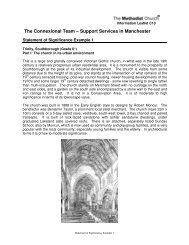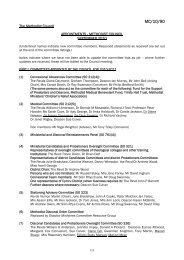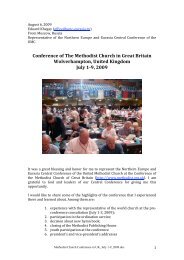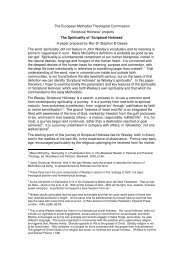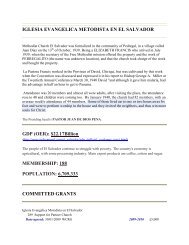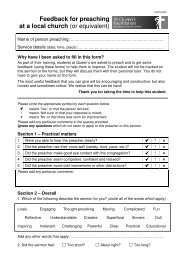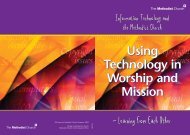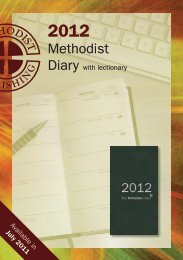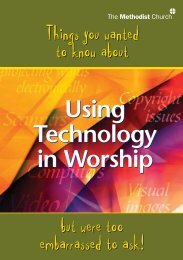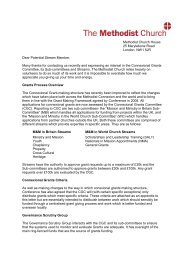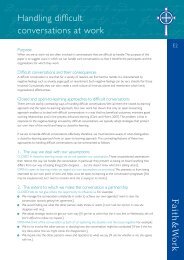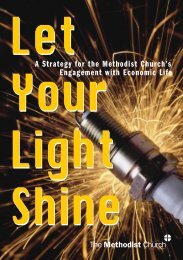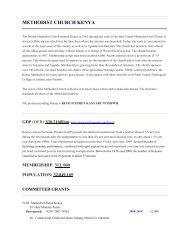Discipleship and the people called Methodists - BEH District
Discipleship and the people called Methodists - BEH District
Discipleship and the people called Methodists - BEH District
Create successful ePaper yourself
Turn your PDF publications into a flip-book with our unique Google optimized e-Paper software.
has become ‘a Church’ its origins remain as a discipleship movement within <strong>the</strong><br />
whole Church of Christ. So if that deep purpose is discerned to be better served<br />
today in a different way, <strong>the</strong>n Methodism must take that very seriously, in order<br />
to remain what, at its heart, it is. What is God saying to us, for example, through<br />
<strong>the</strong> LEPs or United Areas, or about Covenants in Engl<strong>and</strong>, Wales <strong>and</strong> Scotl<strong>and</strong> we<br />
have rightly entered with o<strong>the</strong>r Christians? The ‘ecumenical discipleship’ question<br />
asks us sharply whe<strong>the</strong>r our own buildings are vital <strong>and</strong> must be hung on to at<br />
all costs in order to be faithful; or whe<strong>the</strong>r <strong>the</strong> whole Christian Church’s witness<br />
is more important than even beloved denominational traditions <strong>and</strong> chattels in a<br />
given community.<br />
What elements of Methodism would you not be willing to sacrifice for <strong>the</strong> sake<br />
of greater visible unity of <strong>the</strong> Christian Church in your community? What might<br />
be <strong>the</strong> Methodist contribution to o<strong>the</strong>r Christians in terms of discipleship?<br />
Belonging to a world Methodist family<br />
Koinonia reminds all denominations <strong>and</strong> traditions that <strong>the</strong>y are ‘<strong>called</strong> toge<strong>the</strong>r’<br />
in Christ to be part of something bigger than <strong>the</strong>mselves, <strong>and</strong> connexionalism<br />
serves Methodism in <strong>the</strong> same way. This special sense of being ‘in connexion’<br />
extends to a world Methodist Christian ‘family’ now some seventy plus million<br />
strong, of which <strong>the</strong> British Methodist Church is but a small part. It may come as a<br />
surprise – but a ra<strong>the</strong>r wonderful one I think – that every member of <strong>the</strong> Methodist<br />
Church in Great Britain is by virtue of that membership also a member of <strong>the</strong><br />
Methodist Missionary Society (MMS). In a time when formal membership of most<br />
things appears less appealing to more <strong>people</strong>, I consider this fact alone sufficient<br />
reason to be a member of <strong>the</strong> Methodist Church. We should make more of it on<br />
<strong>the</strong> membership ticket given out to those who commit <strong>the</strong>mselves to this formal<br />
belonging each year.<br />
The origins of what became <strong>the</strong> MMS go back into <strong>the</strong> later eighteenth century<br />
<strong>and</strong> <strong>the</strong> name Wesleyan-Methodist Missionary Society was adopted in 8 8,<br />
suggesting that Methodism expressed itself as a mission society before it formally<br />
identified itself as a ‘Church’ – a term only appearing on membership tickets<br />
much later in <strong>the</strong> nineteenth century. Methodist disciples understood <strong>the</strong>mselves<br />
as ‘mission <strong>people</strong>’ both in <strong>the</strong>ir own neighbourhoods <strong>and</strong> around <strong>the</strong> world. In



